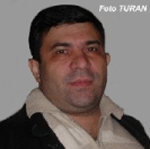Written by HRH Baku/Shahla Ismailova, photos by Turan Information Agency
The murder of the 38-year-old Elmar Huseynov, editor-in-chief of the independent magazine “Monitor,” on 2 March 2005 shocked the Azerbaijani and international community. The popular journalist and analyst with the critical standpoint to the government was shot seven times by a pistol on the threshold of his apartment, therefore, lots of people were certain that Huseynov’s murder was the handiwork of the authorities. (02-MAR-2006)
Pressure on Elmar Huseynov and the magazine “Monitor”
Throughout his career, the journalist Elmar Huseynov had been repeatedly threatened and was frequently ordered to stop his criticism of high-ranking officials. The authorities first harassed Huseynov in 1996, after the Monitor published an article headlined “The Azerbaijani Nation of the 21st Century.” In the summer of 1996 the court fined the magazine 16 million manat for “insulting the Azerbaijani nation,” causing the magazine’s financial ruin. The Monitor resumed work in January 2000 under the name “Monitor Weekly,” only to be closed on May 6 for publishing an article entitled “Heydar Aliyev – Myth and Reality.” The magazine’s editorial office, its printer, the Baku Printing Press printing house, and the Bakinskii Boulevard Newspaper, which Huseynov also published, were sealed for a “violation of tax legislation.” A following audit did not detect any violations and the claims were lifted, but the authorities did not permit the magazine to reopen. At the same time a series of trials against the magazine and its reporters began, all on various defamation charges.
On July 17, 2000 the Yasamal Regional Court decided to deprive Monitor Weekly magazine of its license on one such charge. In 2001 the Nizami Regional Court heard a defamation suit against Huseynov brought by Baku Mayor Hajibala Abutalybov. Huseynov was sentenced to six months in jail, but was pardoned after a month by then-president Heydar Aliyev. In April 2002 the Monitor resumed its work until February 2005. During this period numerous state officials and agencies filed further defamation suits against the Monitor. In 2003 a court fined the Monitor 100 million manat on the basis of a suit brought by Hasan Zeynalov, the Autonomous Republic of Nakhchivan’s representative in Baku, for defaming the Nakhchivani people. The last in the series of suits against Huseynov as the Monitor magazine’s editor was filed in the Nizami Regional Court by Milli Mejlis deputies Siyavush Novruzov and Zalimkhan Yagub “for insults to honor and dignity.” During the years in which the Monitor was published, court officers many times tried to confiscate the equipment of the magazine’s editorial office, Huseynov, and his colleagues. All of this happened against the background of hysterical appeals made by some deputies and state officials to punish critical journalists.
Conclusions of international organizations
When Elmar Huseynov was murdered in 2005, many international organizations logically interpreted it therefore as the logical outcome of the authorities’ policies toward journalists and a general intolerance of independent mass media in Azerbaijan.
“I am shocked with brutal murder of Elmar Huseynov; it is an attack on freedom of expression in Azerbaijan. Elmar Huseynov contributed a great deal to the development of a free press, which is a basis for a democratic society,” Terry Davis, Council of Europe General Secretary, said in a statement.
“Elmar Huseynov’s murder proves that it is dangerous to criticize authorities in Azerbaijan,” read a statement of the nonprofit organization Human Rights Watch (HRW). The HRW continued to state that the murder was probably ordered by people with the purpose of stopping the Monitor’s regular criticism of corrupt officials and intimidating those who would follow Huseynov’s path of independent critical journalism.
The U.S. State Department “expressed shock and sorrow” about the murder of one of Azerbaijan’s leading journalists. “Elmar Huseynov’s murder was a great loss for democracy and free press in Azerbaijan,” read a U.S. State Department statement.
Opinions of the journalist’s collegues
 Huseynov’s colleagues from the opposition and independent mass media likewise saw a link between Huseynov’s murder and his criticism of the authorities. The Yeni Musavat daily reprinted an interview with Huseynov, in which he said that Azerbaijani President Heydar Aliyev had instructed his entourage to “get rid of” the Monitor magazine editor.
Huseynov’s colleagues from the opposition and independent mass media likewise saw a link between Huseynov’s murder and his criticism of the authorities. The Yeni Musavat daily reprinted an interview with Huseynov, in which he said that Azerbaijani President Heydar Aliyev had instructed his entourage to “get rid of” the Monitor magazine editor.
This perception of official complicity was reinforced by an announcement of Ramazan Er, a deputy chief of the Turkish Security Service, at a press conference in Ankara, Turkey. Speaking on behalf of a group of Turkish detectives who had taken part in the investigation of Huseynov’s murder, Er stated that a criminal group led by Haji Mamedov, an Interior Ministry lieutenant colonel, was involved in Elmar Huseynov’s murder. Azerbaijani authorities reacted with shocked indignation, hurriedly refuting the statement which proved their involvement in the crime.
Further evidence for official complicity in the murder was reported by Robert Menard, the General Secretary of the organization “Reporters Without Borders” (RSF) after his visit to Baku on April 6-9, 2005, a visit with the express purpose of meeting with the Azerbaijani President Ilham Aliyev to discuss the case. After the visit RSF issued an eight-page long report, stating that security services agents told Huseynov that he would be killed if he did not stop criticizing Ilham Aliyev and Aliyev family members. Around this time, links between Huseynov’s murder and a larger government conspiracy were reported: various sources claimed that the authorities had created a “blacklist” of people whom they planned to murder prior to the 2005 parliamentary elections; this list included public and political leaders, human rights activists and journalists, such as Elmar Huseynov. In doing so, the government hoped to intimidate the public before announcing a state of emergency in the country, allowing them to possibly even cancel the elections.





